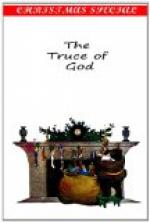Rodolph instantly acceded to the request, and commanded the Baron of Stramen to assist in the enterprise. Though somewhat loath to unite in any undertaking with his sworn enemy, Sir Sandrit had learned to subdue his personal prejudices for the welfare of Germany. And perhaps his desire to avenge his recent wrongs overpowered his aversion to the author of older injuries. He readily assented, and now, united for once, the rival clans of Hers and Stramen moved rapidly across the ice on their chivalrous mission. By a well-executed movement they came unperceived upon the guard. No quarter was given there; scarce a hostile soldier escaped. Sir Albert bade his men spare not the cowards whose swords were red with the blood of babes and mothers. Sir Sandrit, at the top of his voice, shouted, “Remember the castle!” Henry and Gilbert unrelentingly pursued the terror-stricken fugitives. When they returned to the captured camp, every article of luxury was gone. The vessels of gold and silver, which the Patriarch of Aquileia and many of the other nobles had brought to grace the revels of their king, were now in the hands of their rough victors, who brandished the precious goblets in the air, crying, “Death to the spoilers of Suabia!” The purple curtains, torn into shreds, were trailed in the clotted gore and dust. Before many minutes the pillage was as complete as the surprise. When nothing remained to slay or plunder, the barons gave the signal to retreat, and they recrossed the ice. Had they remained an instant longer, Henry IV would have fallen into their hands; for hardly had they left, before the monarch, flying from the battle-field, conducted by a guide named Louis, entered his ruined camp.
The battle was over when the detachment reached the scene of action. Folkmar, governor of Prague, had fallen, Henry had fled, and the Bohemians were routed with prodigious slaughter. The fugitives rallied under the walls of Wartburg. But they were speedily dispersed and pursued, until nightfall saved them from further molestation.
“The mist of Fladenheim is clearing away,” said Rodolph, pointing to the setting sun, which now broke out in unclouded splendor, as the fog vanished before a strong north wind. That day was like his life, most brilliant at its close. Otto now advanced, and the two monarchs embraced with mutual affection and esteem. Whatever rivalry there might be between them was forgotten in success.
Henry retired into Franconia and dismissed his army, and Rodolph again solicited the Pope to confirm his election.
The news of these victories imparted some consolation to the Lady Margaret’s breast, now torn with anxiety and solicitude. Her grief was not lightened because her own misfortunes were avenged in Henry’s adversity, but because the chances of peace were increased by Rodolph’s success. She was now incapable of relishing revenge. The feudal antipathies so long nourished and so early instilled as to be almost a part of her existence, were entirely, eradicated. From the evening of her interview with Father Omehr, before the now ruined Church of the Nativity, she had dedicated her life to the extinguishment of the feud between the houses of Hers and Stramen. For this she had prayed, for this she had toiled. But her labors were interrupted by the harsh music of war, by gong and tymbalon.




